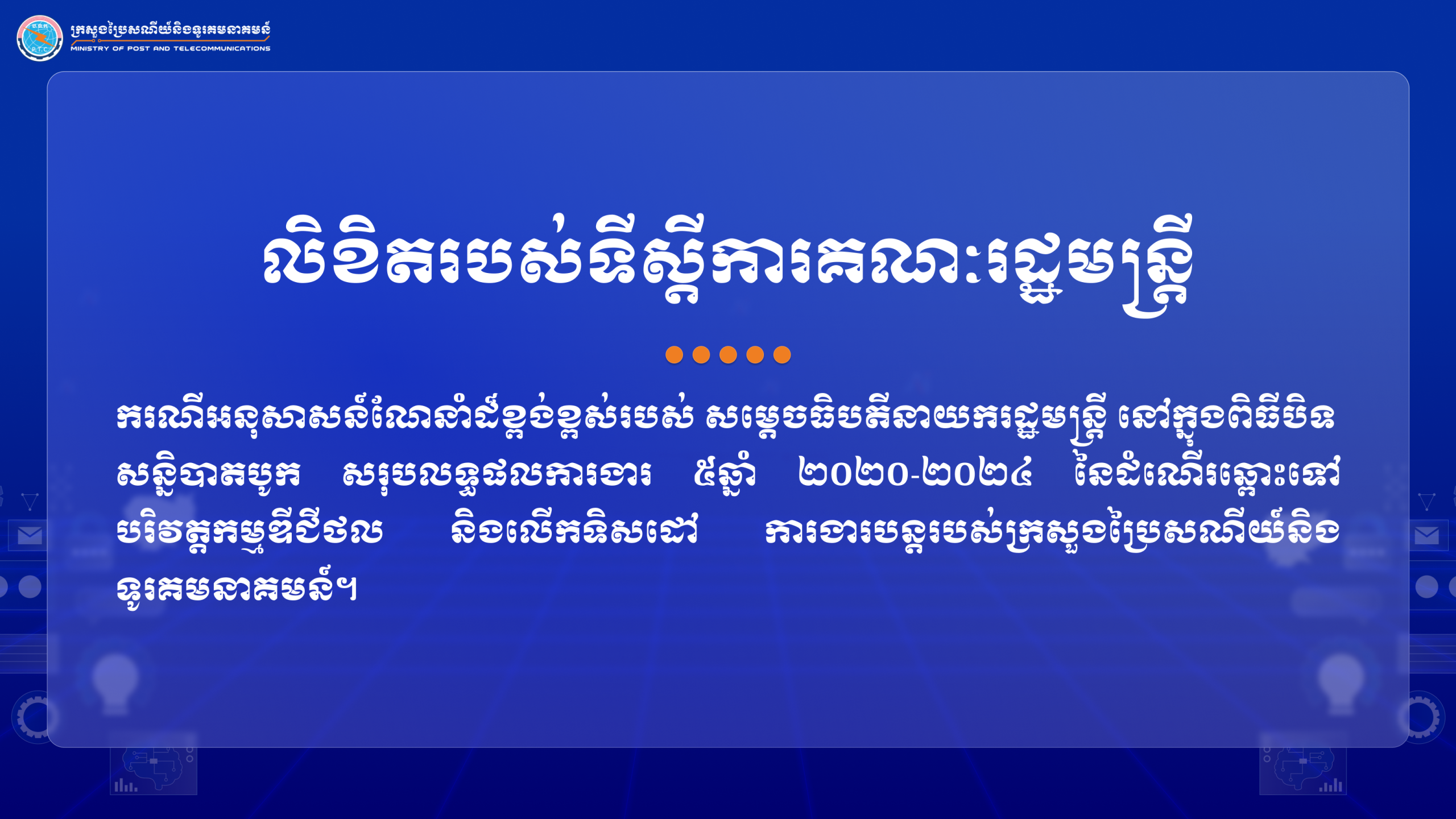ឧបនាយករដ្ឋមន្ត្រីប្រចាំការ រដ្ឋមន្ត្រីទទួលបន្ទុកទីស្តីការគណៈរដ្ឋមន្ត្រី ជម្រាបជូន ឯកឧត្តមរដ្ឋមន្ត្រីក្រសួងប្រៃសណីយ៍និងទូរគមនាគមន៍
កម្មវត្ថុ៖
ករណីអនុសាសន៍ណែនាំដ៏ខ្ពង់ខ្ពស់របស់ សម្តេចធិបតីនាយករដ្ឋមន្ត្រី នៅក្នុងពិធីបិទសន្និបាតបូក សរុបលទ្ធផលការងារ ៥ឆ្នាំ ២០២០-២០២៤ នៃដំណើរឆ្ពោះទៅបរិវត្តកម្មឌីជីថល និងលើកទិសដៅ ការងារបន្តរបស់ក្រសួងប្រៃសណីយ៍និងទូរគមនាគមន៍។
យោង ៖
- លិខិតលេខ២៩៨ បទ. ចុះថ្ងៃទី៧ ខែកុម្ភៈ ឆ្នាំ២០២៥ របស់ក្រសួងប្រៃសណីយ៍និងទូរគមនាគមន៍
- លិខិតលេខ០២៩ ខន/០២៥ សជណ ចុះថ្ងៃទី១៤ ខែកុម្ភៈ ឆ្នាំ២០២៥ របស់ខុទ្ទកាល័យសម្តេច មហាបវរធិបតី ហ៊ុន ម៉ាណែត នាយករដ្ឋមន្ត្រី នៃព្រះរាជាណាចក្រកម្ពុជា
- ចំណារដ៏ខ្ពង់ខ្ពស់បំផុតរបស់សម្តេចមហាបវរធិបតី ហ៊ុន ម៉ាណែត នាយករដ្ឋមន្ត្រី នៃព្រះរាជា ណាចក្រកម្ពុជា ចុះថ្ងៃទី១៣ ខែកុម្ភៈ ឆ្នាំ២០២៥។
សេចក្តីដូចមានចែងក្នុងកម្មវត្ថុនិងយោងខាងលើ ទីស្តីការគណៈរដ្ឋមន្ត្រីសូមជម្រាបជូនឯកឧត្តម ជ្រាបថា រាជរដ្ឋាភិបាលសម្រេចឱ្យក្រសួងប្រៃសណីយ៍និងទូរគមនាគមន៍ (ក.ប.ទ.) និងក្រសួង ស្ថាប័នពាក់ព័ន្ធ អនុវត្តអនុសាសន៍ទាំង១១ចំណុច ដើម្បីរៀបចំជាផែនការសកម្មភាពការងារបានគ្រប់ជ្រុងជ្រោយ និងប្រកបដោយ ប្រសិទ្ធភាព ដូចខាងក្រោម៖
១. ក.ប.ទ. ត្រូវបន្តពង្រឹងអភិបាលកិច្ចក្នុងវិស័យប្រៃសណីយ៍ ទូរគមនាគមន៍ និងបច្ចេកវិទ្យាឌីជីថល អភិវឌ្ឍសមត្ថភាពស្ថាប័ន និងពង្រឹងសមត្ថភាពមន្ត្រីរាជការឱ្យកាន់តែល្អប្រសើរបន្ថែមទៀត ដោយឈរលើមូលដ្ឋាន នៃការកែទម្រង់ដែលបានអនុវត្តកន្លងមក ដើម្បីប្រែក្លាយទៅជាស្ថាប័នគំរូ សម្រាប់ដឹកនាំ គ្រប់គ្រងវិស័យស្ថិតនៅ ក្រោមសមត្ថកិច្ចរបស់ក្រសួង ប្រកបដោយប្រសិទ្ធភាពខ្ពស់។
២. ក.ប.ទ. ត្រូវបន្តពន្លឿនការរៀបចំសេចក្តីព្រាងគោលនយោបាយ ច្បាប់ លិខិតបទដ្ឋានគតិយុត្ត និងគោលការណ៍ណែនាំពាក់ព័ន្ធក្នុងវិស័យប្រៃសណីយ៍ ទូរគមនាគមន៍ និងបច្ចេកវិទ្យាឌីជីថល ជាពិសេស បច្ចេកវិទ្យាឈានមុខថ្មីៗ រួមមាន បច្ចេកវិទ្យាបញ្ញាសិប្បនិម្មិត ម៉ាស៊ីនស្វ័យសិក្សា ទិន្នន័យធំ បច្ចេកវិទ្យាភ្លោះដ បច្ចេកវិទ្យាប្លុកឆេន និង បច្ចេកវិទ្យាអ៊ីនធឺណិតនៃវត្ថុ។ ក្រសួង ស្ថាប័នពាក់ព័ន្ធ ត្រូវសហការគ្នាពន្លឿនការរៀបចំ សេចក្តីព្រាងច្បាប់ស្តីពីសន្តិសុខសាយប័រឱ្យបានឆាប់ ដើម្បីជាមូលដ្ឋានក្នុងបន្តការងារ។
៣. ក.ប.ទ. ត្រូវបន្តពង្រឹងគុណភាពសេវាប្រៃសណីយ៍ លើកកម្ពស់ទំនុកចិត្តលើសេវាប្រៃសណីយ៍ និងការអភិវឌ្ឍវិស័យប្រៃសណីយ៍ ដើម្បីគាំទ្រពាណិជ្ជកម្មតាមប្រព័ន្ធអេឡិចត្រូនិក តាមរយៈការបន្តពង្រឹង ប្រតិបត្តិការរបស់សហគ្រាសប្រៃសណីយ៍កម្ពុជា ការពង្រីកបណ្តាញប្រៃសណីយ៍ឱ្យបានទូលំទូលាយ ការអភិវឌ្ឍ ហេដ្ឋារចនាសម្ព័ន្ធប្រៃសណីយ៍គន្លឹះ រួមមាន ឃ្លាំងភស្តុភារកម្មប្រៃសណីយ៍ និងភណ្ឋាគារគយមានដែនកំណត់ ការដឹកជញ្ជូនគោលដៅចុងក្រោយ និងការត្រៀមដាក់ឱ្យប្រើប្រាស់ថ្នាល DGPost ដើម្បីអភិវឌ្ឍប្រព័ន្ធអេកូឡូស៊ី ប្រៃសណីយ៍រស់រវើក។ ក.ប.ទ. ក្រសួងពាណិជ្ជកម្ម និងធនាគារជាតិនៃកម្ពុជា ដែលជាតួអង្គសំខាន់ក្នុងការគាំទ្រ និងជំរុញពាណិជ្ជកម្មតាមប្រព័ន្ធអេឡិចត្រូនិក ព្រមទាំងក្រសួង ស្ថាប័នពាក់ព័ន្ធ ត្រូវសហការដើម្បីជំរុញ សកម្មភាពពាណិជ្ជកម្មតាមប្រព័ន្ធអេឡិចត្រូនិកឱ្យដំណើរការបានល្អ ដោយលុបបំបាត់ការលក់ទំនិញក្លែងក្លាយ និងការបោកបញ្ឆោតតាមប្រព័ន្ធអនឡាញ។
៤. ក.ប.ទ. ត្រូវយកចិត្តទុកដាក់ពង្រឹងគុណភាពសេវា ពង្រីកវិសាលភាពនៃសេវាទូរសព្ទ និងអ៊ុនធឺណិត តាមរយៈការសាងសង់ស្ថានីយអង់តែនទូរសព្ទចល័ត ការស្ថាបនាបណ្តាញខ្សែកាបលើអាកាសនិងក្រោមដី ការបញ្ចប់គម្រោងបណ្តាញខ្សែកាបអុបទិកក្រោមបាតសមុទ្រឱ្យបានឆាប់ និងការស្ថាបនាបណ្តាញខ្សែកាបអុបទិក ទៅដល់គ្រប់លំនៅឋានប្រជាពលរដ្ឋដែលមានតម្រូវការ។ ក.ប.ទ. ត្រូវរៀបចំផែនការដាក់ឱ្យដំណើរការសេវាទូរសព្ទ ចល័តជំនាន់ទី៥ (5G) ដើម្បីឱ្យរាជរដ្ឋាភិបាលកំណត់ពេលសមរម្យមួយក្នុងការដាក់ឱ្យដំណើរការសេវានេះ។ ក្រសួង ស្ថាប័ន និងរដ្ឋបាលថ្នាក់ក្រោមជាតិ ត្រូវចូលរួមផ្តល់កិច្ចសហការឱ្យបានពេញលេញ ក្នុងការជួយសម្រួល និងពន្លឿននីតិវិធីផ្តល់ការអនុញ្ញាតក្នុងការកសាងហេដ្ឋារចនាសម្ព័ន្ធតភ្ជាប់ឌីជីថល ដោយត្រូវចាត់ទុកថាសេវា ទូរសព្ទនិងអ៊ុនធឺណិត គឺជាសេវាសារវន្ត ដូចសេវាអគ្គិសនីនិងទឹកស្អាតផងដែរ។ ជាមួយគ្នានេះ សូមអំពាវនាវ ដល់បងប្អូនប្រជាពលរដ្ឋទាំងអស់ សូមកុំមានការព្រួយបារម្ភអំពីផលប៉ះពាល់សុខភាពបង្កមកពីស្ថានីយអង់តែន ទូរសព្ទចល័ត ពីព្រោះតាមការសិក្សារបស់អង្គការសុខភាពពិភពលោក គឺពុំមានភស្តុតាងវិទ្យាសាស្រ្តណាដែល បង្ហាញថា ស្ថានីយអង់តែនទូរសព្ទចល័តអាចបង្កផលប៉ះពាល់ដល់សុខភាពរបស់ប្រជាពលរដ្ឋទេ ហើយប្រសិន បើមានការប៉ះពាល់ដល់សុខភាពពិតមែន ប្រទេសទាំងអស់ដែលជាប្រទេសអភិវឌ្ឍ មិនប្រើប្រាស់សេវាទូរសព្ទ ទៀតទេ។
៥. ក.ប.ទ. ត្រូវបន្តយកចិត្តទុកដាក់ក្នុងការគ្រប់គ្រង ការអភិវឌ្ឍ ការស្រាវជ្រាវ និងនវានុវត្តន៍ លើវិស័យបច្ចេកវិទ្យាឌីជីថល ជាពិសេសបច្ចេកវិទ្យាឌីជីថលឈានមុខថ្មីៗ ព្រមទាំងទាញយកប្រយោជន៍ជាអតិ និងកាត់បន្ថយផលប៉ះពាល់អវិជ្ជមាននៃបច្ចេកវិទ្យាទាំងនេះ។ ក.ប.ទ. ត្រូវរៀបចំផែនការយុទ្ធសាស្ត្រ និងផែនការ វិនិយោគតាមដំណាក់កាល ដើម្បីកសាងប្រព័ន្ធអេកូឡូស៊ីជាតិសម្រាប់អភិវឌ្ឍបច្ចេកវិទ្យាឈានមុខថ្មីៗ ដែលរួមមាន អភិបាលកិច្ច ធនធានបច្ចេកវិទ្យាឌីជីថល ធនធានមនុស្ស បច្ចេកទេស និងការអភិវឌ្ឍ ទីផ្សារបច្ចេកវិទ្យាឌីជីថល ថ្មីៗ។ ក.ប.ទ. និងគណៈកម្មាធិការរដ្ឋាភិបាលឌីជីថល ត្រូវរៀបចំអភិបាលកិច្ចឱ្យទាន់ពេល ដោយសារបច្ចេកវិទ្យា បញ្ញាសិប្បនិម្មិតមានភាពលេចធ្លោជាងគេបង្អស់ ហើយនាំមកនូវផលវិជ្ជមាននិងអវិជ្ជមានផង។ ក.ប.ទ. ត្រូវបន្ត សហការជាមួយក្រសួងអប់រំ យុវជន និងកីឡា ក្រសួងឧស្សាហកម្ម វិទ្យាសាស្ត្រ បច្ចេកវិទ្យា និងនវានុវត្តន៍ និង ក្រសួង ស្ថាប័នពាក់ព័ន្ធ ជំរុញការស្រាវជ្រាវ ការអភិវឌ្ឍ នវានុវត្តន៍ និងការប្រើប្រាស់បច្ចេកវិទ្យាបញ្ញាសិប្បនិម្មិត នេះ ដើម្បីបម្រើឱ្យការអភិវឌ្ឍក្នុងវិស័យរបស់ខ្លួន។ ក.ប.ទ. ត្រូវតាមដាន សិក្សាស្រាវជ្រាវ និងស្វែងយល់នូវរាល់ និន្នាការវិវឌ្ឍន៍នៃបច្ចេកវិទ្យាបញ្ញាសិប្បនិម្មិត ព្រមទាំងចូលរួមក្នុងកិច្ចប្រជុំសំខាន់ៗ ក្នុងកម្រិតតំបន់និងពិភពលោក។
៦. ក.ប.ទ. ត្រូវបន្តអភិវឌ្ឍធនធានមនុស្សឌីជីថល តាមរយៈកម្មវិធីអក្ខរកម្មឌីជីថល កម្មវិធីអប់រំ ឌីជីថលកម្រិតឧត្តមសិក្សា កម្មវិធីបណ្តុះបណ្តាលពង្រឹងជំនាញឌីជីថលក្នុងចំណោមមន្ត្រីរាជការ និងកម្មវិធីភាពជា អ្នកដឹកនាំឌីជីថល។ ក.ប.ទ. ត្រូវរៀបចំផែនការបង្កើនការយល់ដឹងអក្ខរកម្មឌីជីថលឱ្យស្របតាម “ក្របខ័ណ្ឌ សមត្ថភាពអក្ខរកម្មឌីជីថល ប្រព័ន្ធផ្សព្វផ្សាយ និងព័ត៌មាន”។ ចំពោះកម្មវិធីអប់រំឌីជីថលកម្រិតឧត្តមសិក្សា រាជរដ្ឋាភិបាលគាំទ្រនិងលើកទឹកចិត្តឱ្យ ក.ប.ទ. បន្តផ្តល់អាហារូបករណ៍ និងជំនួយហិរញ្ញវត្ថុដល់សិស្សឆ្នើម ឱ្យបានកាន់តែច្រើន និងបន្តអនុវត្តគម្រោងប្រកួតប្រជែងនៅកម្រិតគ្រឹះស្ថានអប់រំ ដើម្បីបញ្ញាបនិងផ្សព្វផ្សាយ ការយល់ដឹងអំពីសារៈសំខាន់នៃបច្ចេកវិទ្យាឌីជីថលជាសាធារណៈ និងគាំទ្រចំពោះ ក.ប.ទ. ដែលបានសហការ ជាមួយក្រសួងអប់រំ យុវជន និងកីឡា ក្នុងការជំរុញការធ្វើបរិវត្តកម្មឌីជីថលនិងការផ្តល់មធ្យោបាយបច្ចេកវិទ្យា ឌីជីថលដល់គ្រឹះស្ថានឧត្តមសិក្សា ជាពិសេស ក្នុងការផ្សារភ្ជាប់ការអប់រំជំនាញឌីជីថលទៅនឹងសួនឌីជីថល (Digital Park) ដែលជាគំនិតផ្តួចផ្តើមថ្មីមួយ ដើម្បីលើកកម្ពស់គុណភាពអប់រំឱ្យបានកាន់តែល្អប្រសើរ និងផ្តល់ លទ្ធភាពងាយស្រួល ដល់សិស្សនិស្សិត អាចទទួលបានការងារនៅកន្លែងផ្ទាល់ ឬការងារពីចម្ងាយ ដោយសហការ ជាមួយក្រុមហ៊ុនធំៗ នៅតំបន់ Silicon Valley នៃសហរដ្ឋអាម៉េរិក និងមជ្ឈមណ្ឌលធុរកិច្ចថ្មីឌីជីថលផ្សេងៗទៀត។
៧. ក្រសួង ស្ថាប័នពាក់ព័ន្ធ ត្រូវតែរៀបចំធនធានមនុស្សជំនាញឌីជីថល សម្រាប់គាំទ្រដល់ដំណើរការ នៃការធ្វើបរិវត្តកម្មឌីជីថលផ្ទៃក្នុង និងការផ្តល់សេវាសាធារណៈឌីជីថលដល់វិស័យឯកជន និងប្រជាពលរដ្ឋ ដើម្បីជំរុញការកសាងរដ្ឋាភិបាលឌីជីថល។ រាជរដ្ឋាភិបាលលើកទឹកចិត្តឱ្យ ក.ប.ទ. បន្តជួយបណ្តុះបណ្តាលមន្ត្រី រាជការឱ្យចេះប្រើប្រាស់ឧបករណ៍ឌីជីថល និងកម្មវិធីសុសវែរផ្សេងៗសម្រាប់កិច្ចការការិយាល័យ និងជំរុញបញ្ចប់ ការកសាងផែនការសកម្មភាពបរិវិត្តកម្មឌីជីថលនៅតាមក្រសួង ស្ថាប័នដែលមិនទាន់បានរៀបចំ។ ក.ប.ទ. ត្រូវ បន្តសហការជាមួយក្រសួងមុខងារសាធារណៈ និងក្រសួងសេដ្ឋកិច្ចនិងហិរញ្ញវត្ថុ ដើម្បីបញ្ចប់សេចក្តីព្រាងអនុក្រឹត្យ ស្តីពីគោលការណ៍នៃការរៀបចំអង្គភាពបរិវត្តកម្មឌីជីថលនៅតាមក្រសួង ស្ថាប័ន ប៉ុន្តែចំពោះការអនុវត្តការងារ បរិវត្តកម្មឌីជីថលដែលជាមុខងារគាំទ្រ ត្រូវរង់ចាំរហូតដល់មានការសម្រេចអនុញ្ញាតសិន។ គណៈកម្មាធិការ រដ្ឋាភិបាលឌីជីថល គណៈកម្មាធិការសេដ្ឋកិច្ចនិងធុរកិច្ចឌីជីថល និងលេខាធិការដ្ឋាននៃគណៈកម្មាធិការជាតិ ជំរុញការអនុវត្តវិធានការគន្លឹះក្នុងការកែទម្រង់រដ្ឋបាលសាធារណៈរបស់រាជរដ្ឋាភិបាលនីតិកាលទី ៧ នៃរដ្ឋសភា ត្រូវសហការជាមួយក្រសួង ស្ថាប័នពាក់ព័ន្ធ ក្នុងការរៀបចំសេវាសាធារណៈឌីជីថលនៅថ្នាក់ជាតិនិងថ្នាក់ក្រោម ជាតិ ឱ្យទូលំទូលាយនិងមានប្រសិទ្ធភាពខ្ពស់។
៨. ក.ប.ទ. ត្រូវយកចិត្តទុកដាក់គិតគូរអំពីអភិបាលកិច្ចនិងការគ្រប់គ្រងទិន្នន័យ ការរៀបចំ និម្មាបនកម្មរដ្ឋាភិបាលឌីជីថល ការធ្វើអន្តរប្រតិបត្តិការ ការធ្វើកូដនីយកម្មទិន្នន័យ និងការរក្សាទុកទិន្នន័យនៅ ក្រសួង ស្ថាប័នសាមី ស្របតាមគោលការណ៍សុវត្ថិភាពទិន្នន័យ និងសន្តិសុខសាយប័រ។ ក.ប.ទ. ត្រូវពន្លឿន ការសាងសង់មជ្ឈមណ្ឌលទិន្នន័យជាតិឱ្យបានឆាប់តាមដែលអាចធ្វើទៅបាន។ រាល់ការអភិវឌ្ឍថ្នាល និងកម្មវិធី ឌីជីថលរបស់គ្រប់ក្រសួង ស្ថាប័ន ត្រូវឆ្លងការពិនិត្យ និងវាយតម្លៃផ្នែកបច្ចេកទេសដោយគណៈកម្មាធិការរដ្ឋាភិបាល ឌីជីថល។
៩. គាំទ្រដល់ការដាក់ឱ្យប្រើប្រាស់សាកល្បងនូវផ្ទាល DG SuperApp នៅខែមីនា ឆ្នាំ២០២៥ ខាងមុខនេះ។
១០. ក.ប.ទ. ត្រូវផ្តល់កិច្ចសហការ និងជំនួយបច្ចេកទេសផ្នែកសន្តិសុខសាយប័រដល់ក្រសួង ស្ថាប័ន ដើម្បីការពារថាលនិងកម្មវិធីឌីជីថល តាមរយៈការពង្រឹងយនការឆ្លើយតបបញ្ហាបនាន់នៃកំព្យូទ័រ (CamCERT) ការដាក់ឱ្យអនុវត្តបទប្បញ្ញត្តិផ្ទៃក្នុងនៃការគ្រប់គ្រងសន្តិសុខសាយប័រ និងការដាក់ឱ្យអនុវត្តនិម្មាបនកម្មសន្តិសុខ សាយប័រនៅតាមក្រសួង ស្ថាប័ន ដើម្បីអាចតភ្ជាប់មកមជ្ឈមណ្ឌលប្រតិបត្តិការសន្តិសុខរបស់ ក.ប.ទ.។ ក្រសួង ស្ថាប័ន ដែលមិនទាន់មានបទប្បញ្ញត្តិផ្ទៃក្នុងនិងនីតិវិធីនេះ អាចពិចារណាយកទៅប្រើប្រាស់តាមតម្រូវការបាន។ ក.ប.ទ. ត្រូវបន្តចូលរួមជាមួយ ក្រសួង ស្ថាប័នពាក់ព័ន្ធ ក្នុងយុទ្ធនាការប្រយុទ្ធប្រឆាំងនឹងការឆបោកតាមប្រព័ន្ធ បច្ចេកវិទ្យាឱ្យកាន់តែមានប្រសិទ្ធភាព ក៏ដូចជាជំរុញយុទ្ធនាការផ្សព្វផ្សាយ ការយល់ដឹងអំពីសុវត្ថិភាពអនឡាញ ជាពិសេស ការការពារកុមារតាមប្រព័ន្ធអនឡាញ និងការផ្សព្វផ្សាយតាមក្រុមហ៊ុនបច្ចេកវិទ្យានិងគ្រឹះស្ថានអប់រំ ។ល។
១១. លើកទឹកចិត្តឱ្យសហប្រធានក្រុមការងារផ្នែកសេដ្ឋកិច្ច សង្គមឌីជីថល និងទូរគមនាគមន៍ (ក្រុមការងារ “ណ”) នៃវេទិការាជរដ្ឋាភិបាល-ផ្នែកឯកជន បន្តពិភាក្សាលើសំណូមពរនិងបញ្ហាប្រឈមនានា ព្រមទាំងចូលរួមជំរុញនិងទាក់ទាញធុរកិច្ច និងការវិនិយោគបន្ថែមក្នុងវិស័យឌីជីថល ដើម្បីទទួលបានលទ្ធផល ជាផ្លែផ្កាច្រើនបន្ថែមទៀត សម្រាប់សង្គមនិងសេដ្ឋកិច្ចជាតិ។
Permanent Deputy Prime Minister Minister in charge of the Office of the Council of Ministers To His Excellency Minister of Post and Telecommunications
Subject:
Regarding the most esteemed recommendations of Samdech Thipadei Prime Minister, at the Closing Ceremony of the Conference on Five-Year Achievements 2020-2024 of the Journey towards Digital Transformation and Future Directions of the Ministry of Post and Telecommunications.
References:
- Letter No. 298 BT. dated 7 February 2025 from the Ministry of Post and Telecommunications
- Letter No. 029 KN/025 SCN dated 14 February 2025 from the Cabinet of Samdech Moha Borvor Thipadei HUN MANET, Prime Minister of the Kingdom of Cambodia
- The most esteemed notes of Samdech Moha Borvor Thipadei HUN MANET, Prime Minister of the Kingdom of Cambodia, dated 13 February 2025.
With respect to the above subject and references above, the Office of the Council of Ministers would like to inform Your Excellency that the Royal Government has decided to instruct the Ministry of Post and Telecommunications (MPTC) and all relevant ministries and institutions to implement 11 recommendations in order to prepare comprehensive and effective action plans as follows:
- MPTC shall continue to strengthen governance in the fields of post, telecommunications, and digital technology; develop institutional capacity; and further strengthen the capacities of civil servants by building upon the foundation of reforms that have been implemented in order to become an exemplary institution for leading and governing the sectors under the Ministry’s authority with the highest level of effectiveness.
- MPTC shall continue to accelerate the preparation of relevant policies, laws, regulations, and guidelines in the fields of post, telecommunications, and digital technology, especially emerging technologies such as artificial intelligence, machine learning, big data, cloud computing, blockchain, and the Internet of Things. Relevant ministries and institutions shall cooperate to expedite the preparation of the Draft Law on Cybersecurity as a foundation to support ongoing work.
- MPTC shall continue to enhance the quality of postal services, build trust in postal services, and promote the development of the postal sector to support e-commerce by continuing to strengthen the operations of Cambodia Post, expanding the postal network, developing key postal infrastructure—such as postal logistic warehouses and bonded warehouses—and last-mile delivery systems, and preparing for the deployment of DGPost to foster a vibrant postal ecosystem. MPTC, the Ministry of Commerce, and the National Bank of Cambodia, as key enablers in supporting and promoting e-commerce, along with other relevant ministries and institutions, shall collaborate to boost e-commerce activities effectively by eradicating the sale of counterfeit goods and online scams.
- MPTC shall pay close attention to enhancing the quality of services and expanding the coverage of mobile and broadband services through the cellular stations, the installation of aerial and underground cable networks, the expedited completion of submarine fiber-optical cable project, and the installation of fiber-optical networks to all households in need. MPTC shall also plan for the rollout of fifth-generation (5G) mobile services to enable the Royal Government to determine an appropriate timeline for launching. All relevant ministries, institutions, and sub-national administrations shall provide full cooperation in facilitating and accelerating the approval process for the construction of digital connectivity infrastructure, recognizing that telephone and internet services are essential services on par with electricity and clean water. Concurrently, the public is encouraged not to be concerned about the potential health impacts of mobile phone stations, as studies by the World Health Organization have found no scientific evidence that mobile phone stations pose any adverse effects on people’s health. Moreover, if such impacts existed, developed countries would have discontinued the use of mobile phone services.
- MPTC shall continue to pay close attention to enhancing the management, development, research, and innovation in the digital technology sector, with a particular focus on emerging digital technologies, maximizing the benefits and mitigating the negative impacts. MPTC shall develop phased strategic and investment plans to build a national ecosystem that supports the advancement of emerging technologies. This ecosystem should encompass governance, digital technology resources, human resources, technical capabilities, and the expansion of emerging digital technology markets. MPTC and the Digital Government Committee shall establish governance in a timely manner, given the prominence of artificial intelligence, which brings both positive and negative impacts. MPTC shall continue its cooperation with the Ministry of Education, Youth, and Sports, the Ministry of Industry, Science, Technology, and Innovation, and other relevant ministries and institutions to promote the research, development, innovation, and application of artificial intelligence in support of their respective sectors. MPTC shall monitor, study, and understand trends in the development of artificial intelligence, and actively participate in key regional and international forums.
- MPTC shall continue to enhance the development of digital human resources through digital literacy initiatives, digital curricula in higher education, training programs aimed at strengthening digital skills among civil servants, and digital leadership programs. MPTC shall also formulate a plan to promote digital literacy in alignment with the “Digital, Media, and Information Literacy Competency Framework.” In the area of higher education digital curricula, the Royal Government supports and encourages MPTC to continue providing an increasing number of scholarships and financial assistance to outstanding students, and to continue implementing competition programs at the level of educational institutions to raise public awareness on the significance of digital technology, and supports the collaboration between MPTC and the Ministry of Education, Youth, and Sports in digitally transforming and equipping digital technology assets to higher education institutions, especially the linkage of digital skills training to the Digital Park initiative, which is a new initiative aimed at improving the quality of education and facilitating employment for graduates, including both in-person and remote working, by collaborating with leading companies in Silicon Valley of the US and other digital startup centers.
- Relevant ministries and institutions shall prepare digital talents to support internal digital transformation and the provision of digital public services to the private sector and citizens in order to promote the development of digital government. The Royal Government encourages MPTC to continue training civil servants on the use of digital tools and software for administrative functions, and to promote the completion of digital transformation action plans in ministries and institutions where such plans are not yet in place. MPTC shall continue its cooperation with the Ministry of Civil Service and the Ministry of Economy and Finance to finalize the draft Sub-Decree on the Principles for Organizing Digital Transformation Units in Ministries and Institutions, noting that the implementation of digital transformation work, which is a supporting function, will commence upon the issuance of a formal approval. The Digital Government Committee, the Digital Economy and Business Committee, together with the Secretariat of the National Committee for Promoting the Implementation of Key Measures in Public Administration Reform of the Royal Government for the 7th Mandate of the National Assembly, shall cooperate with relevant ministries and institutions to ensure that digital public services are organized extensively and effectively at both the national and sub-national levels.
- MPTC shall pay close attention to data governance and management, the preparation of digital government architecture, implementing interoperability, applying data encryption, and storing data in ministries and institutions in accordance with data security and cybersecurity principles. MPTC must accelerate the construction of the National Data Center as soon as possible. Each and every development of digital platforms and applications of all ministries and institutions must be subject to technical review and evaluation by the Digital Government Committee.
- Support the pilot deployment of the DG SuperApp in March 2025.
- MPTC shall provide cooperation and technical assistance in cybersecurity to ministries and institutions to safeguard digital platforms and applications by strengthening the capabilities of the Computer Emergency Response Team for Cambodia (CamCERT), implementing the Internal Regulations on Cybersecurity Management, and implementing the Cybersecurity Architecture within ministries and institutions to enable secure connection to the MPTC Security Operations Center. Ministries and institutions that have not had internal regulations and procedures in place yet, may consider adapting those from MPTC, as appropriate. MPTC shall continue to participate with relevant ministries and institutions in efforts to more effectively combat online scams, as well as promote public awareness campaigns on online safety, especially focusing on child online protection and awareness raising among technology companies, educational institutions, etc.
- Encourage the Co-chairs of the Digital Economy and Society and Telecommunications Working Group (Working Group “N”) of the Government-Private Sector Forum to continue discussions on requests and challenges and actively contribute to the promotion and attraction of more businesses and investments in the digital sector, with the aim of achieving more impactful outcomes for society and the national economy.


Leave a Reply